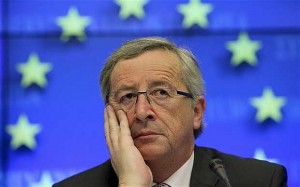
The British debate centers on Juncker’s personal characteristics but it is really about the British islands floating away from the European continent under the leadership of a Prime Minister with a lack of vision.
It’s almost funny how Jean-Claude Juncker has for many in the United Kingdom become “the most dangerous man in Europe”. The usually calm, good humoured Christian democrat was long standing Prime Minister of Luxembourg, the smallest EU state. For most of his political career the 59 year old had only one theme: compromise. Juncker is a master in forging alliances in Europe for Europe.
It says a lot about Britain in 2014 that this moderate man became the devil for many here. “The Sun” went as far as to claim his family was “linked to the Nazis”. It took Ian Traynor in the “Guardian” to put Juncker’s record straight. Juncker’s father was forced into the German Wehrmacht where he was wounded in Odessa. When Juncker came to the Ukraine in 1997 he wept with a Ukrainian whose father had been wounded at the same time fighting the Germans on the Russian side. Juncker is driven by the idea to overcome the old front lines: “We tried to bring Europe forward”, he says in the “Guardian” interview, “and that’s why I still believe in Europe.”
(http://www.theguardian.com/world/2014/jun/20/juncker-merkel-cameron-britain-eu-european-commission)
Most Brits of course did not believe the Nazi plot of the “Sun”. Juncker is being described as absolutely evil for reasons other than his dark continental European past. It is the vision of a bright future for a United Europe with a common political and financial framework to back up a functioning European currency - this is what scares the Brits. Gideon Rachman gives a very good insight into the British reasoning for the Anti-Juncker-campaign in his editorial in this weekend’s “Financial times”: “The British are comfortable in playing the role of Cassandra”, he writes. They think they rightly warned against the creation of the Euro and because their own economy has now recovered from the financial crisis in 2008 “the country’s confidence is bolstered”. (http://www.ft.com/cms/s/0/26d9cb5a-f7b6-11e3-b2cf-00144feabdc0.html?siteedition=uk#axzz35IDnMGpZ)
Still, the campaign about Juncker feels very odd. Even measured and experienced EU experts like Hugo Dixon think Cameron is right to block Juncker. Dixon just wrote a book about Britain and Europe which David Cameron will hopefully read: “The In/Out Question.” (http://www.amazon.co.uk/Out-Question-Britain-should-better-ebook/dp/B00IZJ14YY/ref=la_B0034OX56K_1_1?s=books&ie=UTF8&qid=1403372943&sr=1-1) “Don’t nix it, fix it!” is the sub-title. In his latest Reuters-column, however, Dixon discovers two reasons why the former prime minister of Luxembourg should not be elected head of the EU commission: “Juncker is not the right person to reform the EU and the way he is being promoted constitutes a power grab by the European Parliament.”
The British debate centers on Juncker’s personal characteristics but it is really, sadly, about the British islands floating away from the European continent under the leadership of a Prime Minister with a lack of vision. Juncker is a staunch European federalist, yes. But given the fact that the Euro zone can only work if there is a financial and political framework, the staunch EU federalist is clearly the right man to lead the way. Britain’s problem is that it does not want more political integration on the continent. That’s not Juncker’s fault.
The “power grab” of the EP is a good thing, too. Some of the big problems the EU faces are the democratic deficit and the lack of a European demos. In order to bring the EU elections closer to the people, EU citizens were called to vote for one of the European candidates from the big European parties. The winner was to become president of the EU commission. Juncker, candidate for the conservative EVP, won. If the heads of state would follow Cameron’s call to block Juncker, they would mock European voters. The attempt to bring more democracy to the EU decision making process would be ridiculed. As Polish foreign minister Radek Sikorski said on the Andrew-Marr-Show this Sunday morning: “If the Tory Party were still member of the EVP, Cameron could have tried to block Juncker’s nomination there. To do so after he won the election, is not democratic.”
Even worse: Cameron not only broke his Tories out of the EVP in 2009. He struck an alliance with the “Alternative für Deutschland” in Germany – Angela Merkel's political enemy. Strategically, not a smart move.
But as always when EU matters are discussed, only national interests count. Instead of picking battles he can win, David Cameron runs onto every possible battle field in Europe like a mad man thinking it will will make him look good to his EU skeptic voters at home. Of course, this never works. UKIP’s right populist leader Nigel Farage will always be more ruthless in fighting the evil Europeans – after all he does not have to sit down with them at EU summits and find common ground.
Jean-Claude Juncker will most probably be elected by EU leaders in Brussels at the end of this week. Even the nine left wing prime ministers under Francois Hollande’s leadership back Juncker for EU commission president. Cameron stands alone like a sulky boy among the heads of state and even wants to force an open vote on them over Juncker – a very unusual move in this consensus seeking group. At the end Cameron will look like a man who cannot deliver. Britain will suffer another anti-European episode. An Observer-Poll this Sunday already shows a majority of 48% to 37% of Brits happy to leave the EU if asked at a referendum today.


